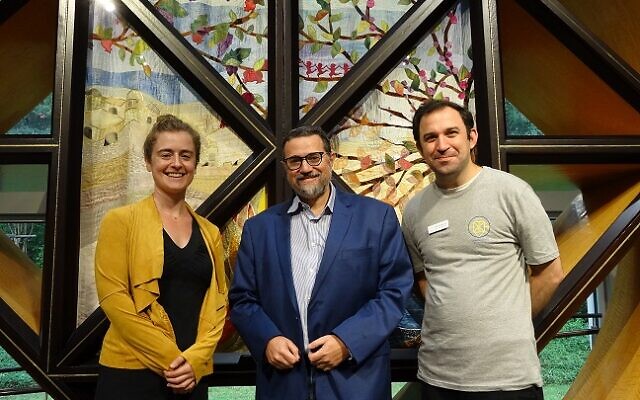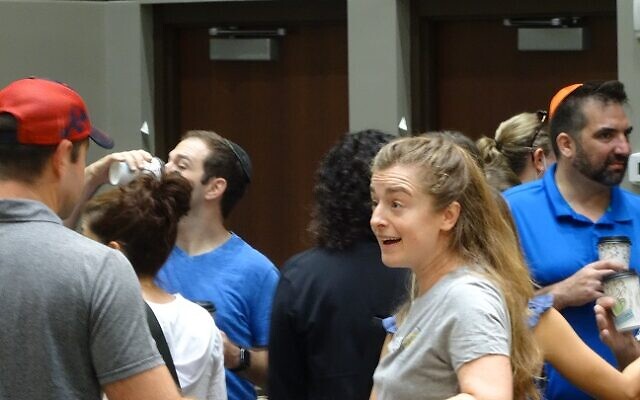B’nai Torah Welcomes New Rabbi
Congregation B’nai Torah introduced its congregation to their newest rabbi, Rabbi Elizabeth Breit, during her welcome weekend shabbat services on Aug. 19 and 20.

After months of interviews and deliberations, Congregation B’nai Torah finally introduced its congregation to their newest rabbi, Rabbi Elizabeth Breit, during her welcome weekend shabbat services on Aug. 19 and 20.
Rabbi Breit will serve as the congregation’s rabbi of engagement, connecting on a more individual level with congregants and helping with community outreach. For one of the fastest-growing synagogues in Atlanta, with over 830 member families, the need for a rabbi in this role has been clear for some time.
“First of all, we want to make sure we have enough clergy that we can serve the needs of everyone in the congregation,” said Senior Rabbi Joshua Heller, “and with engagement specifically, we really wanted to make sure that members of our congregation and the larger community had many opportunities to feel connected to each other.”
Rabbi Breit is uniquely suited for forging these kinds of connections.
Born in Brooklyn and raised in a Reform family, Breit attended Yale, where she studied a wide range of topics — including architecture, neuroscience and Arabic — before semi-settling into religious studies. She applied her love of language here, writing her senior thesis on bilingual Hebrew/Arabic education in Israel, focusing on religious identity at the bilingual school Yad B’Yad. She then spent a year there for a fellowship, studying linguistic identity. Then came divinity school, where Breit focused on chaplaincy. At the time, she had thoughts of becoming a mediator.

“I think that’s also part of my love of languages,” she said, “helping people understand each other when they’re speaking different cultural, emotional, linguistic, sociological, spiritual languages.”
She spent several years utilizing those skills and following one of her other passions, cycling, as a guide for the bike tour company Backroads, leading tours through France, Croatia, Costa Rica and Israel, before eventually returning to the U.S. for rabbinical school. Unfortunately, that was also the time the pandemic hit.
“In the depths of COVID, when I moved back from Israel to New York, I almost quit the rabbinate, because COVID was so isolating and being a rabbi in COVID was so isolating, and I thought, ‘this is absolutely horrible,’” Breit explained. “And then I ended up taking an internship and being a rabbi at the Yale Hillel for the past academic year […] and I loved that. I loved building those relationships.”
In the meantime, B’nai Torah, along with many other Conservative synagogues across the country, was running into some difficulties in their search for a new rabbi. “There were more synagogues nationally looking for clergy than there were graduates,” said the shul’s executive director, Natalie Sarnat.
“During the pandemic, a lot of people who were going to retire postponed retirement,” explained Rabbi Hillel Konigsburg, who has transitioned from associate rabbi to rabbi and director of lifelong learning. “Once the pandemic was here to stay, and people started feeling more comfortable retiring, there were a lot of synagogues that were looking and that complicated the process.”
It also didn’t help that Conservative seminaries were restructuring the way that synagogues were allowed to interview candidates. “It used to be a little more structured,” said Heller, “this year they removed the restrictions, so it was really: whoever you saw first, there was no guarantee you were going to see someone else, and a lot of congregations did not get rabbis this year.”
Thankfully, B’nai Torah was able to interview several candidates, including one who had applied a little later in the process, at the suggestion of her JTS teacher.
Breit said that she immediately clicked, both with the rabbis and the congregation. “I really loved the depth of the place, the depth of tradition, the deep well of knowledge,” she said of B’nai Torah. “I think it’s pretty rare to find that sort of depth of knowledge with the same commitment to inviting everyone and it being open in a particular congregational space.”
Breit says that she hopes to work to preserve and expand this inclusivity. “Some people don’t connect very well, aurally, or visually, or any style of learning, or different ways of showing up socially — I want everyone to feel like they have a way in and not to feel any shame or guilt,” she explained.
Both Heller and Konigsburg said they were excited about the experience and spiritual perspective that Breit will bring to the congregation.
“She is well described by her name. She is very intelligent, and she brings some skills that we were really looking for,” said Heller. “We ended up seeing three strong candidates … I think we got the right person for this job.”



comments